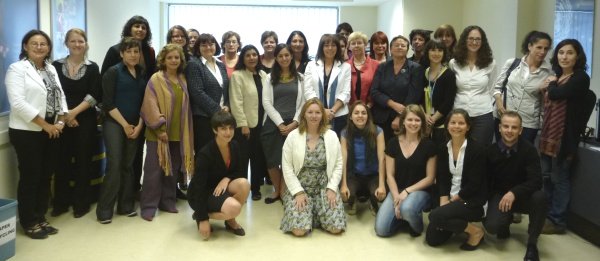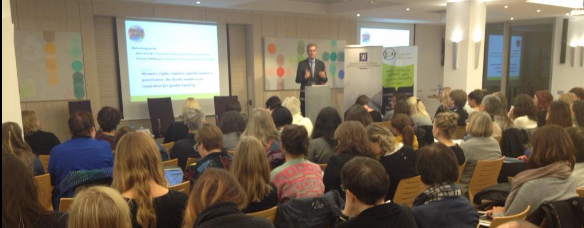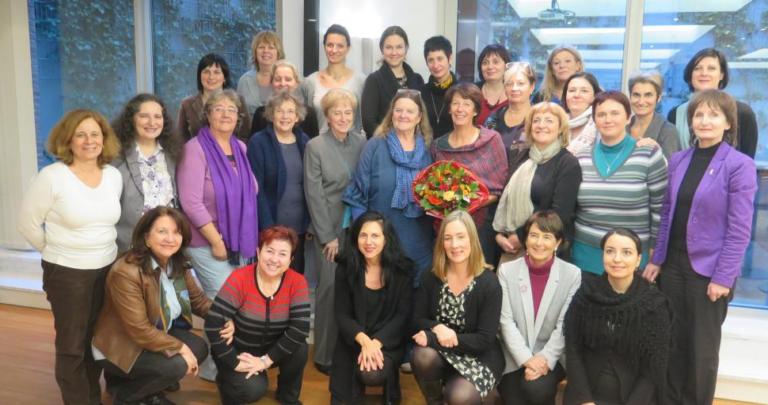[Brussels, 21 June 2011] On 17 June 2011, the European Women’s Lobby had the honour of organising a regional consultation meeting with Ms Rashida Manjoo, UN Special Rapporteur on Violence against Women. The meeting, held in Brussels, gathered representatives of 27 European-wide organisations, and took place in UN House thanks to the support of the Brussels office of UN Women.
Consultations with civil society is an integral part of the work of the Special Rapporteur on Violence against Women, and for the EWL, this European meeting was all the more relevant in that it took place at a key moment, as the EU has put violence against women high on the political agenda.
This meeting therefore represented a key opportunity for all European-wide organisations dedicated to women’s rights and to ending violence against women to share with Ms Manjoo concerns and opportunities about the situation in Europe and to feed significant information into her work. It also gave an opportunity to all partners to engage into common action and joint initiatives at European level to strengthen their advocacy work towards a Europe free from violence against women, including through the EWL proposed initiative of a European Coalition for an EU Year to end violence against women.
The mission of the UN Special Rapporteur on Violence against Women includes the following: Seek and receive information on violence against women; Inform UN on violations of women’s rights in regions of the world; Recommend measures, ways and means, at all levels, to eliminate violence against women. Ms Manjoo’s presentation was very inspiring and gave strong principles for common action: any form of violence against women is a violation of human rights, and women’s rights are not negotiable, at all levels and in all spheres of society. Her May 2011 annual report addressed Multiple and intersecting forms of discrimination and violence against women.
Participants then expressed the main challenges and opportunities they identify at European level with regards to the issue of violence against women. The following points summarise the main issues which were highlighted as worrying tendencies:
- The depolitisation of the issue of violence against women and the growing neutral approach that leads to impunity, lack of protection for women, absence of equality education and training, serious violation of human rights of women in situation of vulnerability (migrant women, elderly women, women with disabilities, transgender women and lesbians, undocumented women, homeless women, Roma women, etc.), de-responsibilisation of men and boys, trivialisation of violence against women in the media;
- The lack of intersectional approach in current policies: policies should take into account the diversity of situation faced by women and girls in Europe in order to counteract multiple discrimination;
- The use of the economic climate to reduce or cut funding to NGOs and service providers, and which reflects governments’ lack of responsibility and their unwillingness to consider violence against women and women’s rights as crucial human rights issues;
- The lack of effective and comprehensive education and prevention policies, which should aim at addressing the structural roots of violence against women: gender stereotypes, patriarchy, sexuality education, etc.
- The absence of an EU strategy to end violence against women, as promised by the European Commission and demanded by the European Parliament and the Council of the EU; without such a comprehensive policy framework, the EU demonstrates its inability to guarantee women’s human rights in the EU, inconsistency with regards to its external policies, and its lack of monitoring on the implementation of existing laws at all levels.
Ms Manjoo reminded all participants that the Council of Europe Convention on preventing and combating violence against women is a great step forward to end violence against women, but that the EU needs its own legislative instrument and should draw its inspiration from the Inter-American Convention on the prevention, punishment and eradication of violence against women, also called ‘Convention of Belem do Para’ (1994), which is the first ever international instrument addressing violence against women.
Thanks again to all participants, to UN Women and the Office of the High Commissioner for Human Rights in Brussels, and of course to Ms Manjoo for her inspiring activism and action, which fostered NGOs’ energy to work together towards a Europe free from violence against women.
Participants to the meeting were representatives from:
- IPPF European Network – International Planned Parenthood Federation
- AGE Platform Europe – European Older People’s Platform
- COMBAT – Daphne project on reducing child trafficking in Lithuania and Bulgaria
- Women Rough Sleepers (Daphne project)
- TOUCH – Daphne Project on street violence
- READAPT – Daphne project on children in families with domestic violence
- Replace FGM (Daphne Project)
- CAVA: Changing Attitudes to Violence in Adolescents (Daphne Project)
- PICUM – Platform for International Cooperation on Undocumented Migrants
- EDF – European Disability Forum
- FEANTSA – European Federation of National Organisations Working with the Homeless
- MHE – Mental Health Europe
- Wagggs – World Association of Girls Guides and Girls Scouts (Europe Region)
- Transgender Europe
- Social Platform
- WIDE – Women in Development Europe / Le monde selon les Femmes (WIDE member organization in Belgium) / Roj Women (WIDE member organization in the UK)
- EWLA – European Women Lawyers Association
- Brussels Ad Hoc Working group on Violence against Women in Conflict (VAWIC)
- IRC – International Rescue Committee
- Amnesty International Norway
- Amnesty International Ireland – End FGM campaign
- ILGA Europe – International Lesbian, Gay, Bisexual, Trans and Intersex Association
- COFACE – Confederation of Family Organisations in the European Union
- WAVE – Women Against Violence Europe
- FAKALI – Federación Andaluza Mujeres Gitanas
- European Women’s Lobby



